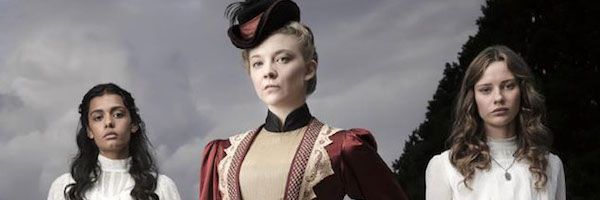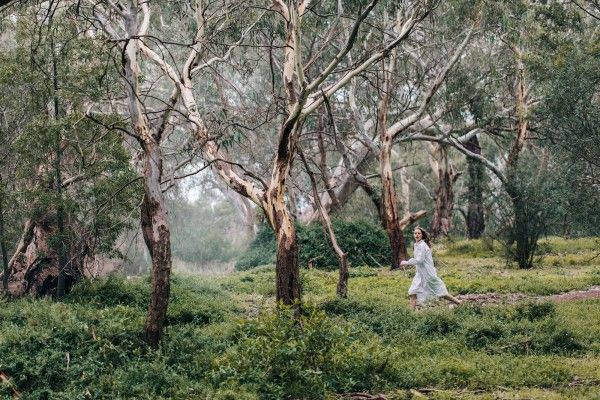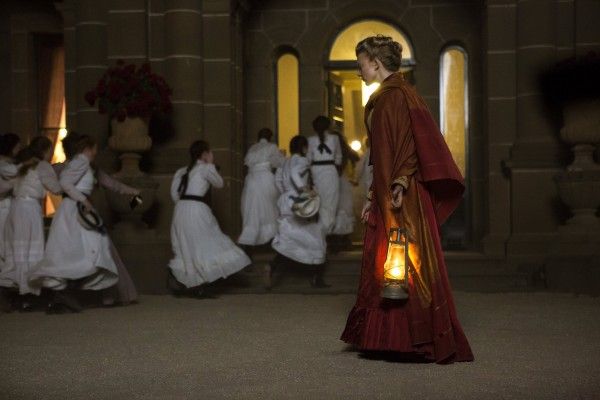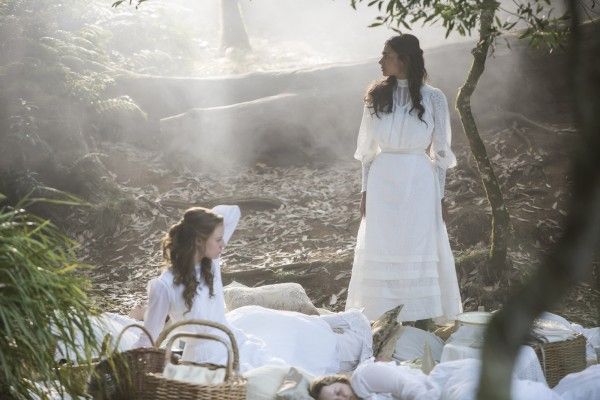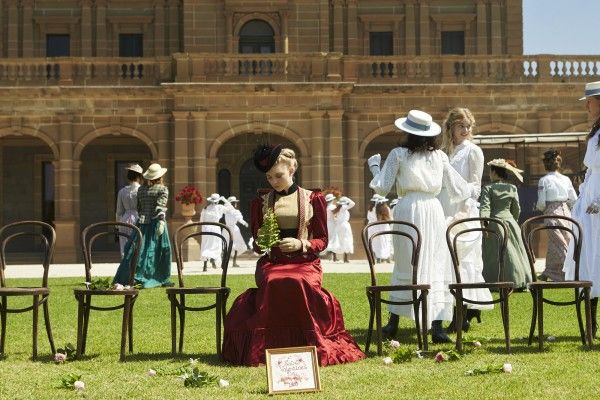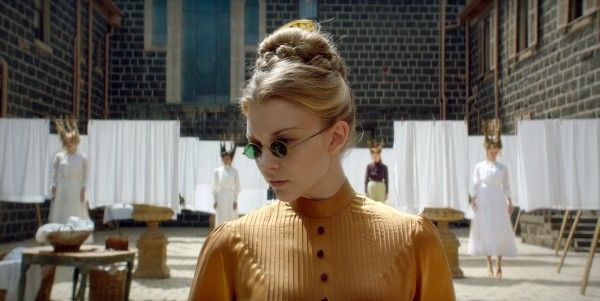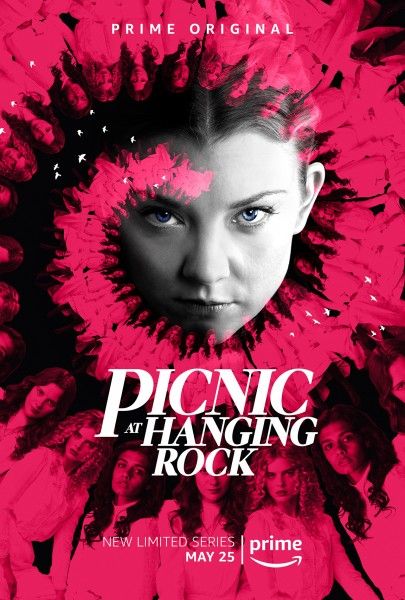From showrunner Larysa Kondracki and adapted from the iconic 1967 Australian novel by Joan Lindsay, the miniseries Picnic at Hanging Rock (streaming at Amazon Prime) tells the story of what happens when a group of schoolgirls from a local college take a day trip to Hanging Rock on Valentine’s Day 1900, and three of the girls and their governess go missing. The disappearance deeply affects the students family and staff of Appleyard College, none more so than enigmatic headmistress Hester Appleyard (Natalie Dormer), who becomes increasingly fearful that her own dark and secret past will be revealed.
At the press day, held at the Greystone Mansion in Beverly Hills, Collider got the opportunity to sit down and chat 1-on-1 with Australian actress Lily Sullivan (who plays Miranda Reid) and French actress Lola Bessis (who plays Mademoiselle Dianne de Poitiers) about why this mini-series felt very liberating to make, how excited they were to play such complex characters, creating their own little world for the shoot, why this story set in 1900 is still so relevant today, and their most fun and most challenges days on set.
Collider: You both were so great in this! These seem like such interesting characters to get to play. When you read this, were you both excited and frightened about playing characters that are this complex?
LILY SULLIVAN: Yes. And then, we met each other [as a cast], we met (showrunner) Larysa Kondracki, (executive producer) Jo Porter, Natalie Dormer and Yael Stone, and we knew we were in good hands. I hope it comes across on screen, but it all felt very liberating to make this show. There wasn’t right or wrong, from day one, which is rare. Also, your mind usually doesn’t allow you to enter that space of comfortableness.
LOLA BESSIS: Also, Larysa gave us a lot of freedom, which is rare. Sometimes you want to propose something because you have an idea and you do it, and the director says, “No, just do the words that you were told.” But Larysa wasn’t like that, at all. She let us do whatever we wanted, and then she would come and direct you and say, “Okay, this is great. This should be different.” So, I was very stressed out when I got the job. I booked it a week before we started filming, plus we didn’t get to read all the scripts. I think I had only the first three episodes.
SULLIVAN: That’s the crazy thing about television. It’s not like film, in that way.
BESSIS: I had a Skype meeting with Larysa, who knew exactly what she wanted and what she wanted to translate in the show. She had this mood board and she told me, “Forget about the movie. That’s not what I want to do. I want to do something much darker and realistic, in terms of what young women are going through in 1900 and how that’s still relevant to today.” That convinced me, but I was still stressed out.
SULLIVAN: It was the realm of the unknown.
BESSIS: I was like, “Okay, she knows what she wants, but how do I give her that? Also, it’s a period piece from 1900, and it was the first time that I was doing a period piece that was so old. I was like, how do we behave? How do you talk? How do you stand? How do you put the corset on? When we had the first read through, I saw all the other actors. I had no idea who got cast for it. Even Natalie [Dormer], I discovered her when we were sitting at the table. Everybody was so perfect, even in their regular clothes. I couldn’t have expected better people to play these characters. Larysa was very good at casting. And then, you discovered the locations and the costumes and the props, and everything was perfect. That helped, a lot. It’s the only job that allows you to time travel. In a second, you’re in 1900, and it becomes very easy.
When we meet these characters, we don’t really know what their history is, but it starts to get peeled away in layers. These women have clearly had lives before we meet them, and it really feels like the characters are lived in.
SULLIVAN: Oh, that’s so awesome to hear! TV shows and films are already shot out of order, and then you add on top that the narrative itself is out of order, and between what’s real and what’s not, your imagination in this show is just as valued as the reality in front of you. To play that, as an actor, everyone had to do so much work, and there was an excitement to do the work. Because everyone was so grateful and had such gratitude to tell their story, and the fact that this happened before the #MeToo movement, it proves that this movement that is happening for women now was already happening before it became a hashtag. It was actually an organic thing. This show is proof that there are cultural shifts that are happening beyond Hollywood.
BESSIS: It’s not just a trend. Also, I don’t know how it happened, and it doesn’t happen, all the time, on every set, but for some reason, at some point, I started thinking like the character. It just felt so natural. And then, when I got back home, it remained there for awhile. I was like, “I’m done. I need to be back to my real life.” Because this world and the locations were so different and magnificent, and the costumes were incredible, it happened very organically. She’s doesn’t do it in an obvious way, but Larysa was responsible for that. I don’t know how she did it, but she helped a lot.
SULLIVAN: What a journey it all was. We shot in Australia, which is a melting pot of people, from all around the world, and we were telling a story that is actually international, which was really cool. It’s been a really fun ride.
Even though this is set in 1900 and you can’t necessarily relate to the struggle of wearing a corset, you can understand and relate to the emotions that all of these women are going through.
BESSIS: Even though we’re wearing those corsets, and we don’t have to wear corsets anymore, in some cultures, women have to wear veils or other things. Even in western cultures, society puts pressure on us to at least try our best to look a certain way. Especially in the film industry, when you’re going to be on a red carpet, people are expecting that you’ll look like a princess. That’s not how you look when you wake up, so it’s a lot of work and a lot of time lost and, in the end, a lot of pressure.
SULLIVAN: The story feels relevant. The show talks about the world conversation, at the moment, with women being silenced and having the power and strength to speak up for themselves when things don’t feel are right, or about things that have been thrusted onto one sex, particularly. I also hope that when young girls watch it, they see the evolution of women and the revolution of women that have gone before them, and can see the respect for the crazy changes we have had. Also, I hope they just really enjoy the really dark, twisted, magic tale, with all of these weird, powerful, young women with a 1900s rock and roll edge. I really hope people can forget all of the intensities of life and just enjoy this weird tale.
There are some quiet moments of support among these women, throughout the story, that are really very beautiful.
SULLIVAN: It was effortless to shoot those scenes. Everyone was nervous, in a way. We all wanted the show to be everything that it could be. And then, the support that followed it was great. There were so many different women. Our show is such a force for women, in different stages and phases, and with different faces. Even in our career journeys, we’re all in such different places and we’re from different parts of the world. There was room for all of us. It was not just the hot girl in the narrative. It wasn’t, “There’s only one girlfriend in the script, sorry,” or “You’re only here to ask the right questions to push the story along.” There was room for everyone on set. Usually, you’re the token girl who plays the girlfriend, or you’re the best friend. There’s room for various women, and the world is craving it.
BESSIS: We were all so close to each other. Filming felt great, especially for me ‘cause I was alone in Australia, far from my family, and we had to go through some personal difficulties while being there. It felt so supportive. There was no ego, at all. Maybe it was the fact that we were surrounded by a lot of girls rather than being the only two girls, which creates a revolt. When it’s only men and you’re the only two girls, you’re like, “Which one is the best?” This was almost all women, so there was no revolt, at all. My character is the teacher that is the closest to the girls, and they really became my new family there. My character has no family there and this school becomes her family and her world, and I spent most of my time with all of these girls and, we really felt like sisters, to me. It was a sisterhood.
What would you say was the most fun day on set, and what was the most challenging day on set?
SULLIVAN: I feel like we could both agree that the most challenging was the day we were both trying not to vomit or shit our pants.
BESSIS: Yeah, we were all sick. There was an epidemic on set. We were filming and we were all sick and, at one point, just couldn’t do anything. You become all yellowish and greenish, and you have to vomit. That was hard.
SULLIVAN: Yeah, and we were in corsets, white dresses, and many layers.
BESSIS: But my personal worst experience was the day when I had to dance the waltz with Ruby [Rees, who plays Edith]. I was supposed to teach the waltz and be very good at it. As a lady in 1900, you’re supposed to know how to waltz, but I’m actually a lady in 2018 and I’m French, and I had no idea. I was sure they would get us a coach, but I got there and they were like, “We’re over time. We have one hour to shoot this entire scene.” I was like, “What do I do?!” Actually, Ruby is 22, in real life, even though she was playing a 13-year-old character, and she was supposed to be a bad dancer. I was supposed to teach her, but she was actually the one teaching me. I was very worried about the scene, but it looks okay. That was the most challenging. It ended up being fun, but that scene wasn’t organic, at all. I was stepping on Ruby’s feet, the whole time.
SULLIVAN: There were pretty dresses and corsets and horses, but it was a really hard shoot. The moments where I was enjoying myself the most were when I pushed into the weird realm of delirium, when you’re just so delirious and you’re in these ridiculous outfits, telling his surreal story about these women. The most fun I had was when everyone was unfiltered and just let themselves completely immerse, but also didn’t take it too seriously. It was hard. The hours were ridiculous, and then there was that sickness, and there was intense emotion going on. Riding the horses was actually fun.
Picnic at Hanging Rock is available to stream at Amazon Prime.

